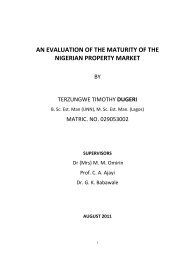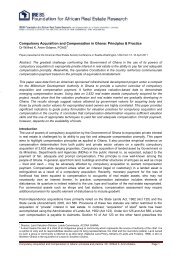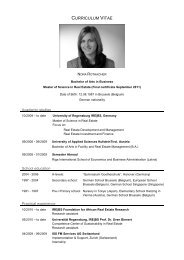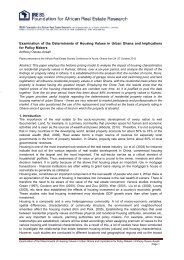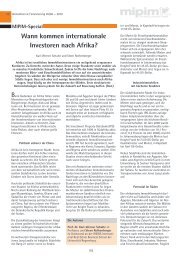You also want an ePaper? Increase the reach of your titles
YUMPU automatically turns print PDFs into web optimized ePapers that Google loves.
facing unprecedented decline in demand and price due to theglobal economic slowdown.Growth has been recorded in all categories of merchandiseimports except for food. Import of intermediate goodscontinued to dominate merchandise imports. Oil importsincreased substantially between 2008 and 2010.Monetary PolicyTanzania’s monetary policy is formulated by the Bank of Tanzaniausing instruments, such as Refinancing Policy, Minimum ReservePolicy, Open Market Policy, Foreign Exchange Interventions, andother instruments. The attainment of the Monetary Policyobjectives is facilitated by a continued application of marketoriented policies in the financial sector, the public sector, theindustrial sector, the agricultural sector and the externalpayments regulatory regime.Legal SystemThe highest court in Tanzania is the Court of Appeal, which hasappellate jurisdiction over the whole of the Republic of Tanzania.To deal with the more complex issues arising in a liberalisedeconomy (such as international business, finance, intellectualproperty and land matters), separate divisions of the High Courthave been established for commercial and land matters.Intellectual PropertyThe Copyright and Neighbouring Rights Act, Revised Edition2002, provides for the protection of copyright and neighbouringrights in literary, artistic works, folklore and other relatedmatters.The Trade and Service Marks Act No. 12 of 1986 provides for theregistration and protection of Trade and Service Marks and forconnected matters.The Patent Act, Revised Edition 2002, provides for thepromotion of inventions and innovation for the facilitation of theacquisition of technology on fair terms through the grant andregulation of patents, utility certificates and innovationcertificates.BankingThe Bank of Tanzania bears the responsibility of establishingconducive monetary stipulations that generate low and stableinflation.The Banking and Financial Institutions Act No.5 of 2006 (BFIA)consolidates the law relating to business of banking, toharmonize the operations of all financial institutions in Tanzania,to foster sound banking activities, to regulate credit operationsand provide for other matters incidental to or connected withthose purposes.InsuranceThe Insurance Act No.10 of 2009 came into force on 1 July 2009and established the Tanzania Insurance Regulatory Authority(TIRA) which, among other things, is vested with the powers toregulate the insurance market in Tanzania as well as to promoteand maintain efficient, fair, safe and stable insurance market forthe benefit and protection of insurance policyholders.Key Strategic Growth Initiatives by Government/Private SectorThe National Strategy for Growth and Poverty Reduction(NSGRP) has identified Private Sector Development (PSD) as animportant source of Tanzania’s economic growth. The strategystipulates that domestic firms, including Small MediumEnterprises (SMEs) will be supported and encouraged to beinnovative, pay attention to product development, quality andsuperior marketing strategies that make them competitive andcapable of responding to global market conditions.The Government of Tanzania has made ‘Agriculture First’ thetheme of the current budget. The initiative, created by theTanzania National Business Council, recognizes the importanceof the agricultural sector in improving the country’s socioeconomicstate and aims to radically revamp it, in conjunctionwith the private sector.Public Private PartnershipThe Public Private Partnership Act No. 19 of 2010 becameeffective on 18 June 2010. Its main purpose is to promote privatesector participation in the provision of public services throughpublic private partnership projects involving investment capital,managerial skills and technology.Economic EmpowermentThe Government of Tanzania implemented the NationalEconomic Empowerment Policy of 2004 by providing soft loansthrough various funds and programmes, sensitization on formingcooperatives (SACCOS) and Village Community Banks (VICOBA),as the best way of achieving soft loans, income generation,employment and poverty reduction.The Government of Tanzania continues to implement theNational Economic Empowerment Policy by disseminating it tothe majority of citizens to enable them to understand it andparticipate effectively in its implementation. It provides trainingto entrepreneurs, sensitization on savings and investments, andconducts studies aimed at developing entrepreneurship skills, aswell as initiating and improving economic activities. In addition,the Government will also continue to promote participation ofpeople in development activities through the Tanzania SocialAction Fund (TASAF).Treaties and Bilateral AgreementsTanzania has entered into bilateral treaties for the promotionand protection of foreign direct investment (FDI) with Denmark,Finland, Germany, India, Italy, Netherlands, Norway, Sweden,Switzerland, United Kingdom and Zambia.Tanzania is a member of several international <strong>org</strong>anizationsincluding The International Centre for the Settlement ofInvestment Disputes (ICSID) and the Multilateral InvestmentGuarantee Agency (MIGA). Tanzania is also a signatory to theNew York Convention on the recognition and enforcement ofArbitration Awards.Membership of International and Regional OrganisationsTanzania is a member of the United Nations Organisation, the<strong>Africa</strong>n Union, the East <strong>Africa</strong>n Communityand the Southern <strong>Africa</strong>n DevelopmentCommunity.Road and TransportTransport in Tanzania is mainly by road,79




